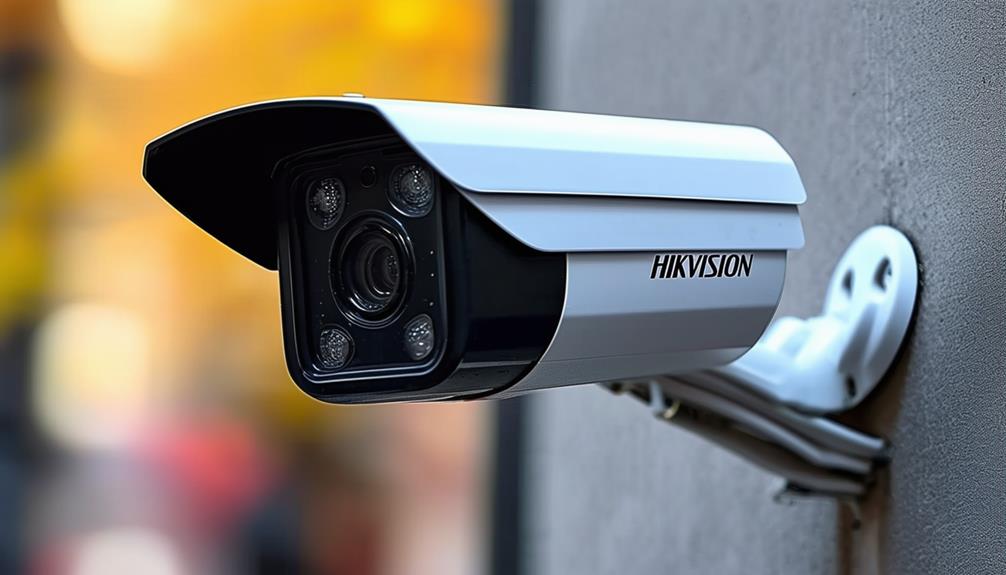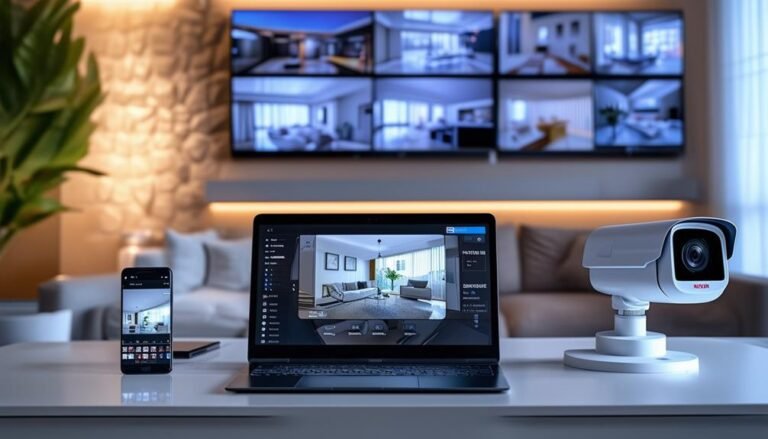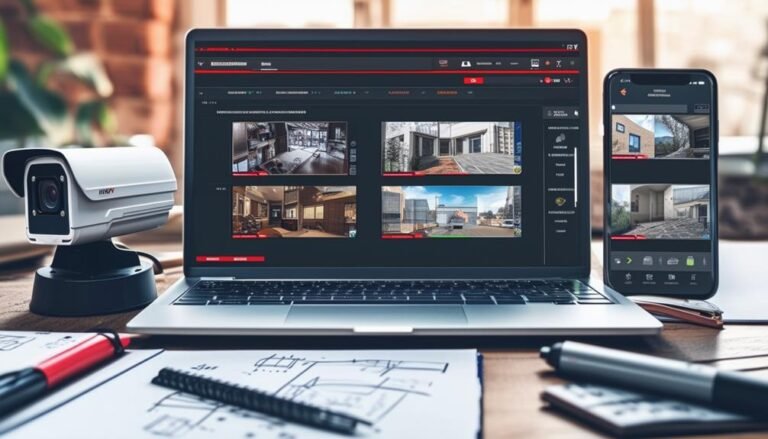Yes, Hikvision cameras can record sound, making them effective surveillance devices. Some models come with built-in microphones, while others allow you to connect an external microphone for audio capture. Sound recording enhances your overall security by providing context to the visuals. However, be aware of local laws regarding audio recording, as they can vary considerably. You’ll need to enable and configure audio settings via the camera’s interface. If you’re curious about the different Hikvision models or how to set up these features effectively, there’s plenty more to discover that could help you optimize your security system.
Overview of Hikvision Cameras
Hikvision cameras, known for their advanced features and reliability, are widely used in both residential and commercial settings. If you’re seeking a surveillance solution that offers peace of mind, these cameras deliver. With their cutting-edge technology, you can easily monitor your property, ensuring your space remains secure.
What sets Hikvision apart is their range of options. You’ve got everything from bullet cameras to dome models, each designed to meet different needs. Whether you want to keep an eye on the front porch or monitor a large warehouse, there’s a Hikvision camera suitable for you. Their high-definition video quality means you won’t miss any detail, allowing you to feel confident in your choice.
Installation is straightforward too. Most models come with user-friendly interfaces and mobile apps that let you access live feeds from your smartphone or tablet. So, even when you’re away, you can check in on things with just a few taps. Plus, the cameras come equipped with features like night vision, which means you can rest easy knowing you’re covered around the clock.
Hikvision cameras also allow for customization. You can set up motion detection alerts, ensuring you’re notified only when something important happens. This helps you maintain that sense of freedom without being overwhelmed by constant notifications. The combination of reliability, advanced features, and ease of use makes Hikvision cameras a top choice for anyone looking to enhance their security.
Audio Recording Capabilities
While many surveillance systems focus solely on video recording, some Hikvision cameras also offer audio recording capabilities. This feature can enhance your security setup by providing a complete picture of events as they unfold. Imagine being able to not only see but also hear what’s happening in your monitored area. This could be invaluable in various situations, from monitoring business premises to keeping an eye on your home.
When you opt for a Hikvision camera with audio recording, you can capture sounds, conversations, and other auditory details that may be vital for understanding incidents or guaranteeing safety. It’s like having an extra layer of security that allows you to gather more thorough evidence if needed. This capability can deter potential intruders, as they may be aware they’re being recorded both visually and audibly.
However, it’s important to take into account the legal implications of audio recording in your area. Many places have strict laws regarding consent for recording conversations. You’ll want to make sure that you’re in compliance with these regulations to protect your rights and freedoms while still keeping your environment secure.
In short, Hikvision’s audio recording capabilities can greatly enhance your surveillance efforts. By adding sound to your security arsenal, you gain a more in-depth understanding of activities around you. So, if you’re looking to increase your peace of mind and maintain control over your surroundings, exploring these features could be a worthwhile investment.
Types of Hikvision Cameras
When it comes to surveillance, there are various types of Hikvision cameras to choose from, each designed to meet specific needs and environments. Whether you’re securing your home or monitoring a business, understanding the options available can help you make an informed decision.
You might consider dome cameras, which are discreet and versatile. Their low profile makes them perfect for indoor use, blending seamlessly into office spaces or retail environments. If you need something more robust, bullet cameras are a great choice. With their elongated shape, they’re ideal for outdoor settings, providing clear images even in challenging weather conditions.
For wider areas, panoramic cameras offer a 180° or 360° view, allowing you to cover large spaces with a single unit. If you want flexibility, PTZ (pan-tilt-zoom) cameras let you remotely control the camera’s direction and zoom in on specific areas as needed. This can be especially useful for tracking movement in real-time.
Another option is the thermal camera, which detects heat rather than visible light. This is beneficial for nighttime surveillance or low-light conditions, ensuring you’ve got eyes on high-risk areas regardless of the time of day.
Lastly, there are smart cameras equipped with AI capabilities that can distinguish between people and objects, helping to reduce false alarms. With such a diverse range of Hikvision cameras available, you can easily find the right fit to enhance your security while maintaining your freedom and peace of mind.
Legal Considerations for Audio Recording
When considering audio recording with Hikvision cameras, it’s essential to understand the consent requirements that vary by location. Not every jurisdiction has the same laws, so knowing your local regulations is key to staying compliant. Failing to comply could lead to legal issues, so it’s worth taking the time to research.
Consent Requirements for Recording
Before installing audio recording features on Hikvision cameras, it’s vital to understand the legal landscape surrounding consent requirements. Recording audio without proper consent can lead to serious legal repercussions, and it’s important to be aware of the laws in your area.
In many places, you need to obtain consent from individuals before recording their conversations. This might mean informing them that they’re being recorded or obtaining explicit permission. Ignoring these requirements can not only infringe on personal privacy but may also expose you to lawsuits or fines.
Even if you own the property where the camera is installed, it doesn’t automatically give you the right to record audio without consent. Many states have specific two-party consent laws, meaning both parties involved in the conversation must agree to being recorded.
To stay on the right side of the law, consider posting clear signage indicating audio recording in the area. This can serve as a proactive measure to inform anyone entering that their conversations may be recorded. Ultimately, respecting privacy while enjoying the benefits of surveillance isn’t just ethical; it’s vital for staying compliant with the law.
Jurisdictional Legal Variations
How do jurisdictional legal variations impact your ability to record audio with Hikvision cameras? The answer lies in understanding the laws specific to your region. In some areas, recording audio without consent may breach wiretapping laws, while others might allow it under certain conditions. You’ve got to know where you stand legally to avoid potential consequences.
For instance, in the U.S., laws differ from state to state. Some require all-party consent, meaning everyone being recorded must agree, while others only need one party’s consent, which could be you. If you’re in a country with stricter privacy laws, the rules might be even more stringent. Failing to comply can lead to hefty fines or worse.
It’s essential to research your local regulations before setting up audio recording. Ignorance of the law won’t protect you from penalties. If you value your freedom and want to use Hikvision cameras effectively, consider consulting a legal expert. They can help you navigate these complex laws and guarantee you’re recording legally, allowing you to focus on what matters most—keeping your space secure without unnecessary legal headaches.
Setting Up Audio on Hikvision Cameras
Although setting up audio on Hikvision cameras may seem challenging at first, it’s relatively straightforward with the right steps. To begin, verify that your camera has built-in audio capabilities or an external microphone connected. If you’re using a microphone, plug it into the correct port on the camera, usually labeled as audio in or mic input.
Next, access the camera’s settings through the web interface or mobile app. You’ll need to log in using your credentials. Once logged in, navigate to the “Configuration” section, where you’ll find options related to audio settings. Look for the audio input settings; here, you can enable audio recording and adjust the volume levels to suit your needs.
Don’t forget to take into account the format of audio recording. Verify you’re using a compatible format that aligns with your storage and playback preferences. After configuring the necessary settings, save your changes. It’s always a good idea to test your setup before relying on it for important recordings.
You can do this by playing back a video to check if the audio is clear and at the desired volume. If you notice any issues, revisit the settings and make adjustments as needed. This hands-on approach not only boosts your confidence in using the equipment but also guarantees that you have full control over your surveillance system. Remember, setting up audio can enhance your overall security experience, giving you the freedom to capture every moment without missing a sound.
Benefits of Recording Sound
Recording sound with your Hikvision cameras can greatly enhance your surveillance experience. When you incorporate audio into your security system, you gain a more thorough understanding of events as they unfold. You’ll be able to hear conversations, detect unusual noises, and capture critical audio evidence that could prove essential in various situations.
One considerable benefit is that sound can provide context to the visuals. A video clip of an incident might show actions, but without audio, you may miss important details that explain motivations or intentions. This added layer of information can be key in evaluating situations accurately.
Moreover, recorded audio can serve as a powerful deterrent against potential intruders. When people know they’re being recorded both visually and audibly, they’re less likely to engage in criminal behavior. This dual layer of surveillance can make your property feel safer and more secure.
Another advantage is the ability to document interactions for future reference. If you’re running a business, having audio records of customer interactions can be invaluable for resolving disputes or improving service quality. You’ll have a clearer insight into customer feedback, which can help your enterprise thrive.
Lastly, sound recording can aid in compliance and accountability. Whether it’s monitoring employees or ensuring safety protocols are followed, having audio alongside video can help keep everyone accountable. All in all, incorporating sound into your Hikvision cameras can greatly enhance your surveillance capabilities and provide you with peace of mind.
Limitations of Audio Features
While the benefits of audio recording are notable, there are several limitations to assess with Hikvision cameras. One major concern is that not all models come equipped with built-in microphones, which means you might need to invest in external audio devices to capture sound effectively. This can complicate your setup and add to your overall costs.
Additionally, even if your camera does support audio recording, the quality might not meet your expectations. Many Hikvision cameras focus primarily on video resolution, so the audio quality can be subpar, resulting in muffled or distorted sound. This limitation can greatly hinder the effectiveness of your surveillance efforts, especially if you’re relying on clear audio to capture important details.
Another limitation is the legal aspect of recording audio. In many regions, there are strict laws governing audio surveillance, especially when it comes to recording conversations without consent. This could create potential legal liabilities for you, leading to complications if you’re not fully aware of your local laws.
Lastly, the storage capacity is something to reflect upon. Audio files can take up considerable space, especially if you’re recording for extended periods. This might require you to manage your storage more actively, which can be a hassle if you’re aiming for a streamlined operation.
User Experiences and Feedback
Many users have shared their experiences with Hikvision cameras, particularly regarding the sound recording capabilities. If you’re considering these cameras, you’ll find a mix of opinions that can help you decide whether they meet your needs. Here are three key takeaways from their feedback:
- Sound Clarity: Many users appreciate the clarity of sound when the cameras do record audio. They’ve noted that conversations can be picked up clearly in quieter environments, which can be vital for security.
- Installation and Setup: Users often mention that setting up the sound features can be tricky. Some have struggled with the initial configuration, while others found it straightforward. It’s important to read the manual or watch tutorials to navigate this process smoothly.
- Privacy Concerns: There are mixed feelings about recording audio. Some users feel empowered by the ability to capture everything happening in their vicinity, while others express concerns about privacy. Balancing security and privacy is a significant factor many consider.
Alternatives to Hikvision for Audio Recording
If you’re considering alternatives to Hikvision for audio recording, there are plenty of options available. Audio-enabled security cameras can provide high-quality sound alongside video, while smart home solutions often integrate seamless audio capabilities. Exploring these alternatives can help you find a system that meets your specific needs.
Audio-Enabled Security Cameras
When it comes to audio-enabled security cameras, several alternatives to Hikvision can effectively capture sound alongside video. If you’re looking for options that give you both freedom and functionality, consider these three choices:
- Logitech Circle 2: This camera offers a simple setup and high-quality audio recording. Its flexibility allows you to place it indoors or outdoors, giving you control over your surveillance needs.
- Amcrest ProHD: Known for its robust features, the Amcrest ProHD provides excellent video quality and two-way audio. You can communicate through the camera, allowing for real-time interaction with anyone on the other end.
- Reolink RLC-410: This camera not only records in 4MP but also features built-in microphones. It’s perfect for those who want to monitor their property without sacrificing audio clarity.
Choosing the right audio-enabled security camera can enhance your surveillance experience, providing peace of mind while ensuring you stay connected. Whether it’s for home or business, these alternatives to Hikvision help you maintain control over your environment.
Smart Home Solutions
Smart home solutions have become increasingly popular for those looking to enhance their security systems with audio recording capabilities. If you’re seeking alternatives to Hikvision, there are plenty of options that prioritize your privacy while delivering exceptional performance.
Consider brands like Arlo or Ring. They offer security cameras equipped with two-way audio, allowing you to communicate seamlessly through your devices. These systems not only let you monitor your property but also enable you to interact with visitors or deter intruders effectively.
Another great choice is Google Nest, which combines advanced features with user-friendly interfaces. Their cameras capture audio and video in high definition, ensuring you don’t miss a moment.
For those who prefer a more integrated approach, smart home hubs like Samsung SmartThings allow you to connect various devices, including audio-enabled cameras, making it easier to manage everything from one app.
Frequently Asked Questions
Can Hikvision Cameras Connect to External Microphones for Better Sound Quality?
Yes, Hikvision cameras can connect to external microphones for improved sound quality. By using a compatible microphone, you can enhance the audio clarity and capture more precise sounds. Just make sure the camera model supports external audio input. This flexibility allows you to customize your setup, giving you the freedom to record high-quality sound tailored to your needs. So, whether it’s for surveillance or content creation, you’ll enjoy better audio results.
How Can I Tell if My Hikvision Camera Records Audio?
To find out if your Hikvision camera records audio, check the specifications in the user manual or the settings menu. Look for options related to audio input or audio recording. If there’s a microphone icon or settings for audio channels, it likely records sound. You could also try playing back footage to see if any audio is present. If you’re still unsure, contacting customer support might help clarify things further.
Are Hikvision Cameras Waterproof for Outdoor Use?
You know that feeling when you’re caught in the rain, and your gear’s not up to par? Well, with Hikvision cameras, you won’t have to worry about that. Most models are designed for outdoor use, featuring IP ratings that indicate their resistance to water and dust. Just check the specifications of your specific model to be sure. When you’re protecting your space, you want reliable equipment that can handle whatever Mother Nature throws your way!
Do Hikvision Cameras Reduce Video Quality When Recording Audio?
When considering video quality, you might wonder if adding audio affects it. Generally, Hikvision cameras are designed to maintain video clarity, even when recording sound. While there could be slight variations depending on settings and conditions, you shouldn’t notice a significant drop in quality. It’s important to adjust your camera’s settings for peak performance; this way, you can enjoy both clear video and audio without compromising your surveillance needs.
What Is the Warranty Policy for Hikvision Cameras Regarding Audio Features?
When it comes to Hikvision cameras, their warranty policy typically covers manufacturing defects, but it might not specifically address audio features. You’ll want to check the warranty terms for your specific model. If you’re concerned about sound recording, it’s a good idea to clarify any doubts directly with the manufacturer or your retailer. They can provide detailed information on what’s covered, ensuring you’re fully informed about your camera’s capabilities.



